| Reviews & Columns |
|
Reviews DVD TV on DVD Blu-ray 4K UHD International DVDs In Theaters Reviews by Studio Video Games Features Collector Series DVDs Easter Egg Database Interviews DVD Talk Radio Feature Articles Columns Anime Talk DVD Savant Horror DVDs The M.O.D. Squad Art House HD Talk Silent DVD
|
DVD Talk Forum |
|
|
| Resources |
|
DVD Price Search Customer Service #'s RCE Info Links |
|
Columns
|
|
|
Eureka - Season Two
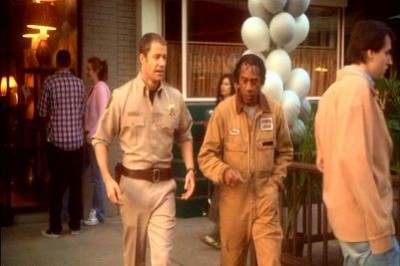
Series: Eureka Season 2 continues the story as laid out in Season 1 (solid review by John Sinnott). Eureka is actually a corporate town set up by the government decades ago as a think tank for the best and brightest minds of society in the hopes of advancing science during the cold war. The company that employs everyone is called Global Dynamics, the peer review process alive and well as facilitated by the usual corporate structure most people are familiar with (oversight provided by the US military). All aspects of science are aggressively supported, from pure research to applied particle physics, allowing the scientists the freedom to truly explore the unknown, handling the consequences as needed. Due to events in the first season, head honcho Nathan Stark (played by Ed Quinn and no relation to Tony Stark of Iron Man fame) has been replaced by his ex-wife, Allison Blake (Salli Richardson); the woman a tempered version of her ex, considered less willing to endanger the population for the benefit of an experiment as he was known to do. Nathan was working on an advanced project called "The Artifact" in the last season, something so powerful, so advanced, and so ultimately dangerous, that the audacity he displayed in attempting to push forward with it so quickly was clearly the result of his ego and brilliance; even his superior intellect unable to avert the consequences when something inevitably went wrong.
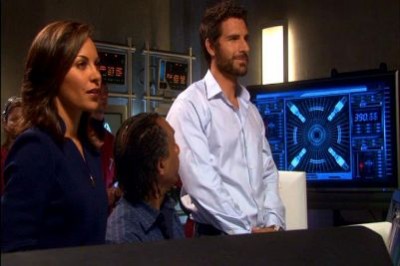
Allison being less volatile, and her expertise as yet unknown in terms of her scientific abilities, is a great administrator though, far better than Nathan and a better choice to lead the company as far as the military brass is concerned. Her son Kevin (Meshach Peters) was displayed as autistic in season one but due to the exploding Artifact has been evolving into something far more advanced; displaying various abilities as the second season continues. The danger for the show of a character like this is that he could easily render most plot devices moot and weaken the entire show so I was pleasantly surprised to see the writers "resolve" his character by the end of the season; the "go to Kevin" dynamic employed too often before that but done relatively subtlety all the same. Nathan's drive the entire season has been to reclaim Allison and save Kevin; decidedly changing his character for the better in a number of ways (from the cocky, "I know best" scientist who embraces the idea that the ends justifies the means to a concerned father figure no less intelligent but tempered with the wisdom of experience).
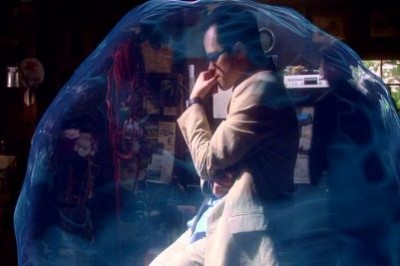
The rest of the town is an odd assortment of quirky characters, each of them brilliant in their own field of endeavor but each of them caught up in their own narrowly targeted niche too. From zany Jim Taggart (Matt Frewer of Max Headroom fame) and his experiments with animals to geeky assistant Fargo (Neil Grayson) to culinary genius Vincent (Chris Gauthier) to a number of others, the idea that a top secret town of super geniuses all nestled away under the protective eye of the military (but not working on many weapons, almost none in fact, betraying the biggest stretch of the imagination for the series to date) is appealing. The down side to everyone being so smart though is the trouble they all get into at times, be it from accidents involving their research, the way experiments interact negatively with one another, or the trouble caused by devious minds out to reap more than they've earned. That is why the lead character, the town sheriff named Jack Carter (Colin Ferguson), is so appealing too.
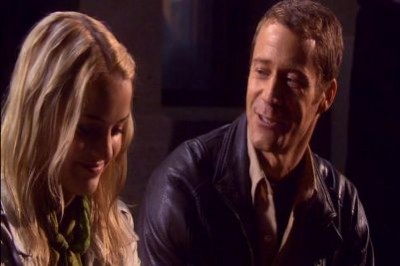
Jack stumbled into the town at the beginning of the first season and was almost immediately reassigned from his federal marshal post to become the small town law enforcer of choice. Arguably the least intelligent person in town, including all the children shown to date too, Jack is the dose of reality that makes the scientists more human. While some of them, Nathan in particular, look down on the guy, in nearly every episode it is Jack's thinking that restores the town, his questions to those with more technical knowledge giving them the insights needed to alter the course of events at the last moment as is standard in this type of show (the first act introduces the problem, the second shows it impacting the characters, and the third shows the evolving nature of the danger posed before Jack rallies the brainiacs to save the day). His best friend in town is a man called Henry Deacon (Joe Morton), a man whose technical wizardry is equal to any of his peers, rivaling Nathan if not surpassing him. Morton's connection to science fiction as a "fix it" man goes back a long way too; his "Brother From Another Planet" impressed me as cool and original while his role as the head researcher in Terminator 2 proved he could act; his acting ability the best of the entire cast. The combination of Jack and Henry working on any problem translates into results; their chemistry together the glue that makes the show for me.
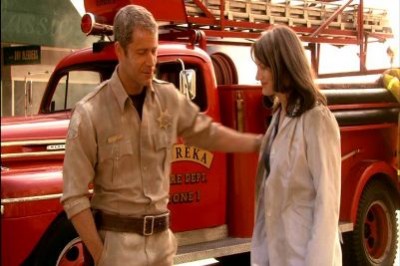
The typical episode will show Jack involved in investigating a strange occurrence, tracking down leads while using Henry as his one-man CSI. For his part, Henry is the helpful associate, having left Global Dynamics to continue working on various projects of his own, signifying that the company does not have a complete lock on everything that happens in Eureka that the writers have yet to fully explore. Allison has a grasp on what even the retirees are doing for the most part, her most used phrase being along the lines of telling Jack something is too classified for him to know about, but the season long arc involves Henry reapplying to work at the company (his motivation being to secretly investigate the death of his lover from season one). Jack has his own irons in the fire too, from his daughter Zoe (Jordan Hinson) getting all hormonal over guys (turning sweet sixteen), his ambitious deputy Jo Lupo (a former Special Forces leader that becomes like the big sister Zoe never had), to surprise appearances by his ex-wife intent on taking Zoe back to civilization. Mix in a bunch of scientific blunders that almost always result in a doomsday scenario each episode and you have the basics of the show.
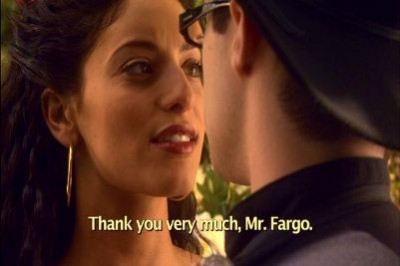
Were that all there was to Eureka, it would work better as a miniseries but the way the characters interact make it special (for me at least). I wasn't too keen on the season opener, Phoenix Rising wiping out most of what happened last season (Jack and Henry the only ones to remember the former timeline until Henry wipes it from Jack's memory) but that did help elevate the sexual tension in the Allison/Jack/Nathan love triangle where both men pursued her relentlessly. Jack getting another love interest weakened it but fans of that sort of thing might appreciate how newcomer Zane Donovan (Niall Matter) came out of nowhere to spark the interest of Jo; likeable Fargo doing his best to keep up the possibility of getting the girl himself. There was also the expansion of the characters that a first season typically fails at, fleshing out some of the nuances (some major developments with Henry being the most obvious but Jack's comfort level with the geniuses my favorite part), and the "redo" of the opener might have worked better to make this happen; Jack's naiveté that he would be with Allison all over again subtlety showing his lack of understanding about changing time lines.
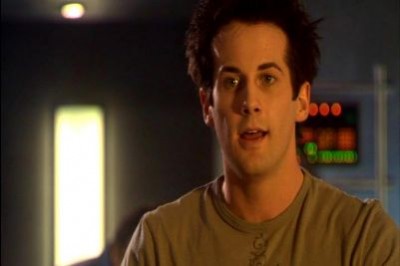
Fans of Stargate SG-1 will want to note that there were five or six cameos, most notably Michael Shanks as an offbeat alchemist in All That Glitters and Teryl Rothery as a grieving widow in God is in the Details (though the most fun was Lexa Doig as the head of human resources practically raping Jack in Maneater). Ultimately though, the tensions of the personalities and the circumstances they were thrust into were the best reason to watch the show. Season Two has been called the "dark" season since there was so much going on, the "doom of the week" pushing that dynamic way too far and the full season arc played a bit too lightly at times considering the consequences of the possibilities (the relatively weak use of Debrah Farentino's character bugged me too). Still, Erica Cerra continued to charm as the tough girl and hints that she was the second dumbest member of the community after Jack "111" Carter were downplayed too much. The concept that the members of the community were all "above the law" and authority in general were not so subtle in this regard, but hardly as prevalent as they could have been if the writers had taken the easy route and stereotyped all the scientists as elitists. Jack's oath to protect the community, even from itself, is always going to be in direct contradiction with their pursuit of science (to a degree) and the eye rolling when Jack makes a suggestion or comment was probably overplayed too (like his physical comedy used to lighten the mood so often). The religion versus science episode, God is in the Details, was also a conceptual favorite because even if the writers weren't happy with it (per their podcast commentary); it showed Nathan and Jack on a similar wavelength beyond just how much they cared about Allison, perhaps the first point where they were shown as more alike than not in the show.
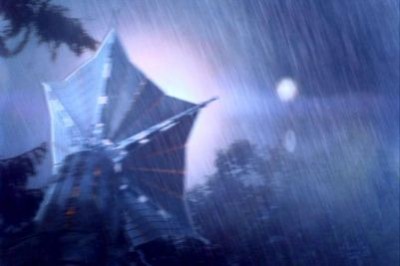
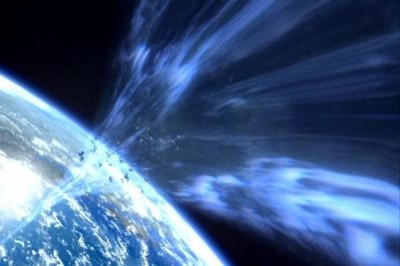
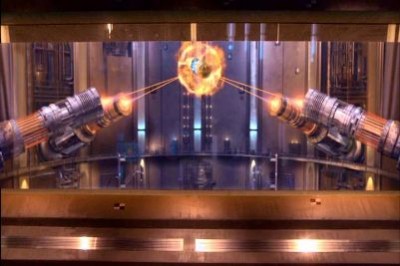
The episode introducing Zane, E=MC...?, was another stab at the relative levels of intelligence between the mundanes like Jack and the rest of the town but it was pulled off nicely enough given the set up, serving as a nexus episode for several future plots too (like Zane's romance of Jo). And those that fault the nod to parenting by Jack with regard to Zoe will have a lot to come to terms with as it was so heavily reinforced in so many episodes, Jack growing a pair in how he disciplined her when she messed up (as well as how the community is willing to overlook the means as long as the outcome works in shows like Duck Duck Goose; rewarding treachery over good sportsmanlike conduct when the ladies sabotaged each other's projects at the science fair). I could go on and on about the improvements of the writing, the increasing depths of the characters, and the quality of the show but where the first season was full of largely unrealized promise, the season two set was something I could Highly Recommend.
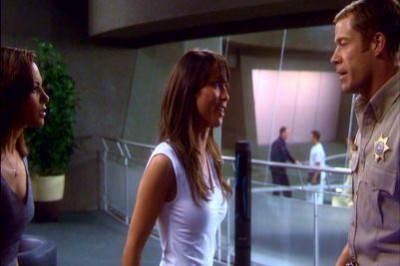
Picture: Eureka Season 2 was presented in the same 1.78:1 ratio anamorphic widescreen color it was shot in by the variety of directors the show used, the standard definition version released in MPEG-2 as expected. The video bitrate was on the low side, typically under 4 Mbps to allow so much material to be included on the three double layered discs, but aside from some grain and light moiré, it was looked pretty good. The colors were accurate, the framing of the shots were handled with care, and most of the CGI special effects were done competently enough, though I have to agree with the production staffers that pointed out how much more they wanted to do in specific scenes but slightly dropped the ball in favor of production schedules. There were more scenes shot in darker settings this time, be it the bowels of the city, night time, or in darkened offices when the various electric maladies occurred and you may notice some of the issues easier in these scenes but they were still about what I would expect from a Sci-Fi Channel show.
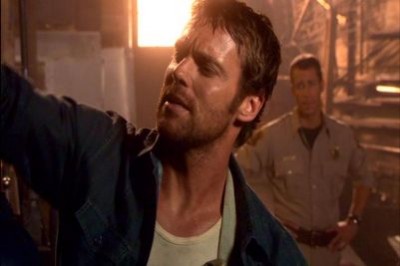
Sound: The audio was presented in 5.1 Dolby Digital Surround English using a48 kHz sampling rate and a 448 Kbps audio bitrate with optional English language subtitles. The vocals were clear, the score fitting, and the special aural effects all were balanced nicely. The center speaker received most of the attention here, nothing surprising since the majority of the show is dialogue driven, but the bass came more to life during the "event sequences" where some experiment went astray or Jack had to jump to action. There use of the rear speakers was minimal otherwise so this is an area that the show could improve but it was always well within established norms of recent television shows.
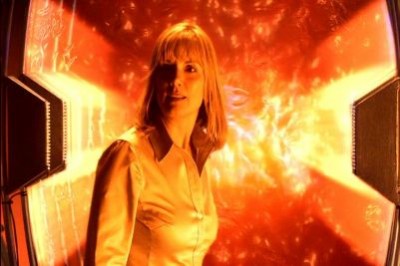
Extras: A show like Eureka is the perfect example of a series that uses extras to make a big difference as fans tend to be more demanding than usual. Each of the three discs had some deleted scenes (several minutes each) and while most of them were unpolished looking, virtually all of them added some understanding of what was going on in the scenes. I can't stress enough that some of the nuances of exactly what took place can be explained in these scenes, from personal motivations to larger events in context, to filler context that occasionally was needed to make full sense of what was going on at times. The first disc also had a short feature bringing people up to date on where the show was heading called Happenings Around Town, The Second Season that explained in more detail a few of the perceptions by cast and crew how things evolved (watch it after the episodes though because of spoilers). There were some Webcasts as shown online during the season, typically focusing on Colin Ferguson or Joe Morton giving some background and a hilarious set of short Public Service Announcements (PSA's) by the characters (seven in all) under the Live Smart Eureka banner. There were then podcast commentaries to Try, Try Again by Colin Ferguson and Neil Grayston as well as a crew version by Charile Craig and Thalia St. John on the first disc, one for Sight Unseen using Charlie Craig on the second disc, and God is in the Details with Jaime Paglia & Eric Wallace as well as Maneater with Charlie Craig and Bruce Miller. The commentaries were not the usual fluff pieces either for while they congratulated each other more than a few times for things that worked; they also discussed the shortcomings of some shows and what they wanted to fix on others. If you're a fan, you will definitely want to listen to them. There were some trailers and a slip cover on the DVD case, my only complaint being how tightly the center spindle's held onto the discs (possibly increasing the chances of breaking one).
Final Thoughts: Eureka Season 2 set out to give viewers more of what they wanted and in better context, now that the basic characters and setting were firmly established. In large part, the staff succeeded in this quest, building more layers to be followed up upon and a better mythology as time went on. While many of the questions from the first season were answered, all new questions were raised, giving plenty of room for more exploration in later seasons should the viewership warrant it (and I hope it does). There have been several spoiler ridden articles about the third season (which starts soon) and while I fully expect seeing an episode where Jack is made super intelligent, Zoe's IQ is shown to be sufficient to keep her in the mix at school (face it, a 157 is run of the mill in a town like Eureka), and some of the love interests pushed further (more about Fargo's rivalry with Zane could humanize all three of that triangle, Jo already proving to be a scene stealer every time she shows up), and some of the lesser known names pushed into a more ensemble dynamic. As long as each episode doesn't continue the doom of the week culture of season two, I'll probably be quite happy but the extras, the technical matters, and the rest of the show were all engaging so check it out, even if you decide to skip the first season altogether (not advised but understood given the mixed reviews).
|
| Popular Reviews |
| Sponsored Links |
|
|
| Sponsored Links |
|
|
| Release List | Reviews | Shop | Newsletter | Forum | DVD Giveaways | Blu-Ray | Advertise |
|
Copyright 2024 DVDTalk.com All Rights Reserved. Legal Info, Privacy Policy, Terms of Use,
Manage Preferences,
Your Privacy Choices | |||||||













